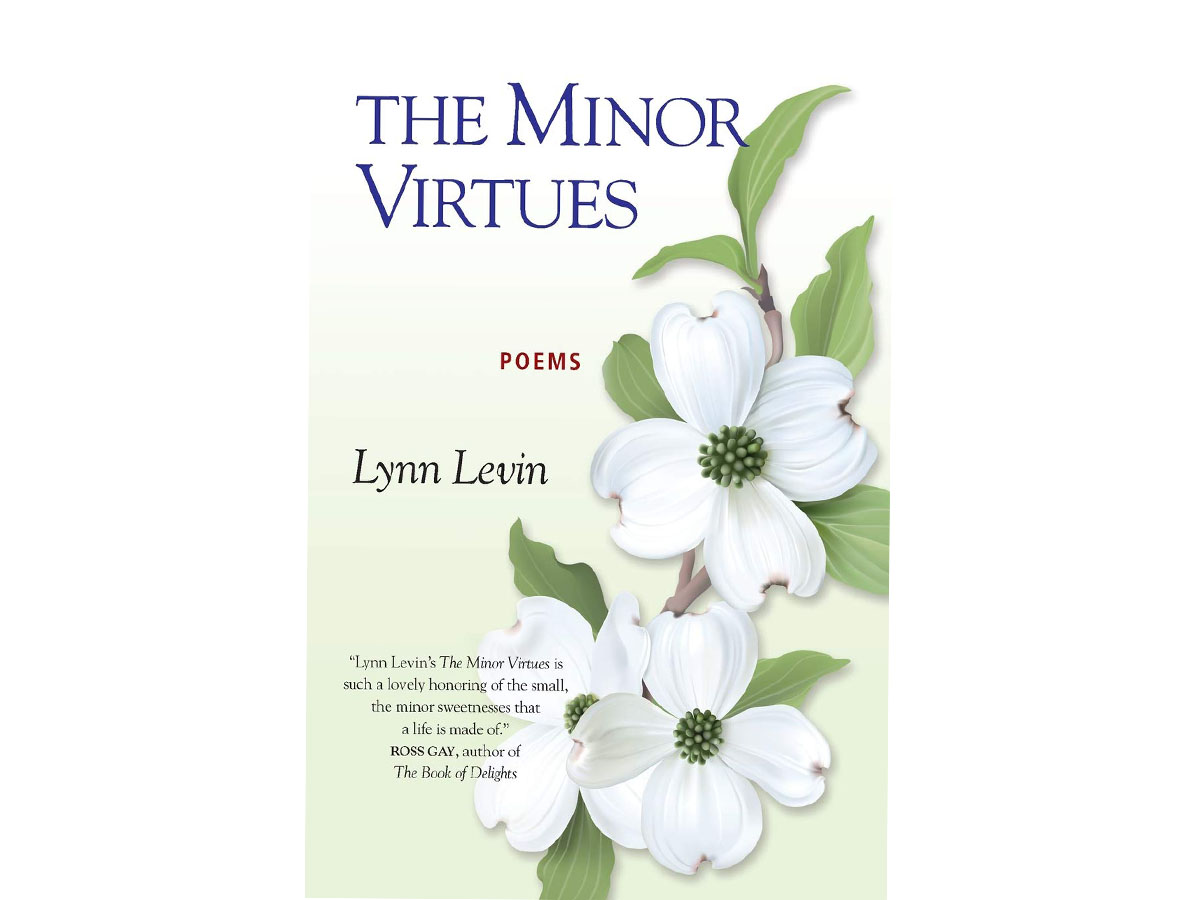The major virtue of Lynn Levin’s The Minor Virtues is that you read it, cover to cover, with a smile. Not that poetry always has to be happy, or even has to give pleasure. There’s all kinds of poetry for all kinds of uses. But it’s wonderful to sit down with a book of poems and read with delight all the way through—and you really do that with The Minor Virtues.
Levin teaches at Drexel University and taught for a long time at the University of Pennsylvania. This, her fifth poetry collection, delights with variety, displaying the many things she’s good at, not to show off, but to explore the world through carefully worked poems. She’s a born satirist, and satire, if not the main tenor as perhaps it was in her previous book, the celebrated Miss Plastique, is here for sure, as in “Sex.” There she appropriates Marianne Moore’s “Poetry,” switching the title and topic. You start to snicker beginning with “I, too, dislike it: there are things that are important beyond all this fiddle.” But a change-up is coming; you can just feel it, and you’re meant to.
Levin’s also a storyteller. “Dizzy, 1963” tells how she, wanting “to know/how it felt to hit a real/baseball,” filched and lost her father’s prized ball signed by Dizzy Dean and others. “Sleepless Johnston” brings us along on a jailbreak and a multi-state chase.
Levin’s also a born humorist. We have three funny poems about Lilith. One’s a limerick. Then there are two longer narratives. In the first, Adam’s other spouse is a freelance writer across the millennia, ending up sitting (as many of us do) “before a keyboard and screen.” In the second, Lilith takes up online dating. These and other poems end with a minor-key irony characteristic of Levin’s work. We are being readied for it as we read, so when it comes, it’s a letdown, not as in a “disappointment” but as in “the only possible ending.”
Levin’s also confident and creative with form. She can spin off open-form verse with anyone, but she’s also drawn to traditional musical forms and variants thereof. And does she wring some breathtaking variations out of them. Here, in its entirety, is “A Morpho Menelaus”:
I thought my life would be complete
If I found a morpho in the wild.
I hatched my dream when as a child
I learned of butterflies that beat
their blue wings in the jungle heat.
It would take years and many miles
to try to make my life complete
by finding a morpho in the wild.
On the Napo River a fleet
iridescence passed before my eyes —
its azure foil a patch of sky
almost low enough to reach.
I thought my life would be complete.
The rhyme scheme sets off as though it will be regular a-b-b-a, but, hold on, we switch in the second to a-b-a-b, where “miles” eases away from the perfect rhymes we’ve heard so far. That unlacing will get furthest with “eyes,” “sky,” and “reach” before snapping back to the last line, repeating the first but with an entirely new meaning—the speaker is elated at seeing the Morpho, chastened at realizing her life is not complete. Welcome again, dying fall.
Levin plays productively with rhythm, beginning with five regular lines, then unsteadying that with “it would take years and many miles.” Sure, you could read it as regular with a stress on “would,” but no, “it would take” demands to be read as a dactyl, derailing the flow. And “On the Napo River a fleet/ iridescence passed before my eyes” is bumpy loveliness. Rhyme and rhythm destabilize as childhood certainty dissolves.
Which brings us to the title sequence. It’s one of five sections, the others being “Friends, I Burst into Your Day,” the entertaining “Riddles and Such,” “To the Ether,” and “The Consummate Hour.” A title like The Minor Virtues is an IED, a pretense to being slight while intending the opposite. If that pretense seems a little heavy, these poems vindicate it. “Buying Produce at the Marked-Down Cart” starts homely enough, but reveals a habit formed, the speaker tells us, during days as a “gleaner” of “meager pay” who bought “the scratched and bruised.” We land in a profound place:
More than anything I hate waste
and yet how much
of my own life have I let go unused.
“Writing in Longhand,” an elegy for a now-neglected skill, unfolds with Levinesque emotional I.Q., as she rereads letters she wrote as a younger woman:
My m’s fan out
to v’s. The ends of words trail off.
My own script indecipherable to me.
Making out a person’s script involves making the person out as well. The poem leaves us with very major virtues, as Levin considers how her parents’ handwritings changed:
Later the glove of age upon the hand
The shaky Love, Dad Love, Mom. And still the flutter
of Valentines and birthday cards, the fear
that made the trembling signatures more dear.
That space between the signoffs—how it bids us visualize the bottom of the letters, two separate hands, aging together. At this piercing moment, Levin closes with a rhyming iambic pentameter couplet, as Shakespeare closes many scenes. Risky? She brings it off, having earned a dignified, time-conscious gesture.
The poems in The Minor Virtues are straightforward, often funny, never stuffy, always poignant. Satirists, humorists, and wits often avoid outright sincerity, deal in the veiled self. Not this poet. That’s another quality that makes her work so singular and delightful. In one poem, the speaker sees one woman do a favor for another and declares that “Almost every other good/ thing I’ve ever seen has paled/ before” it. Those lines remind us of the virtue that makes The Minor Virtues so major: Lynn Levin’s unapologetically open heart.
The Minor Virtues
By Lynn Levin
Ragged Sky Press
Published on March 16, 2020
90 pages

John Timpane, the former Books Editor and Theater Critic for the Philadelphia Inquirer, is a retired English teacher and journalist living and working in New Jersey. His work has appeared in Sequoia, North of Oxford, Apiary, Painted Bride Quarterly, Schuylkill Valley Journal, Per Contra, Vocabula Review, Truthdig, and elsewhere. His latest book, a chapbook, is Buck in the Piano Room (Philadelphia: Moonstone Press).
